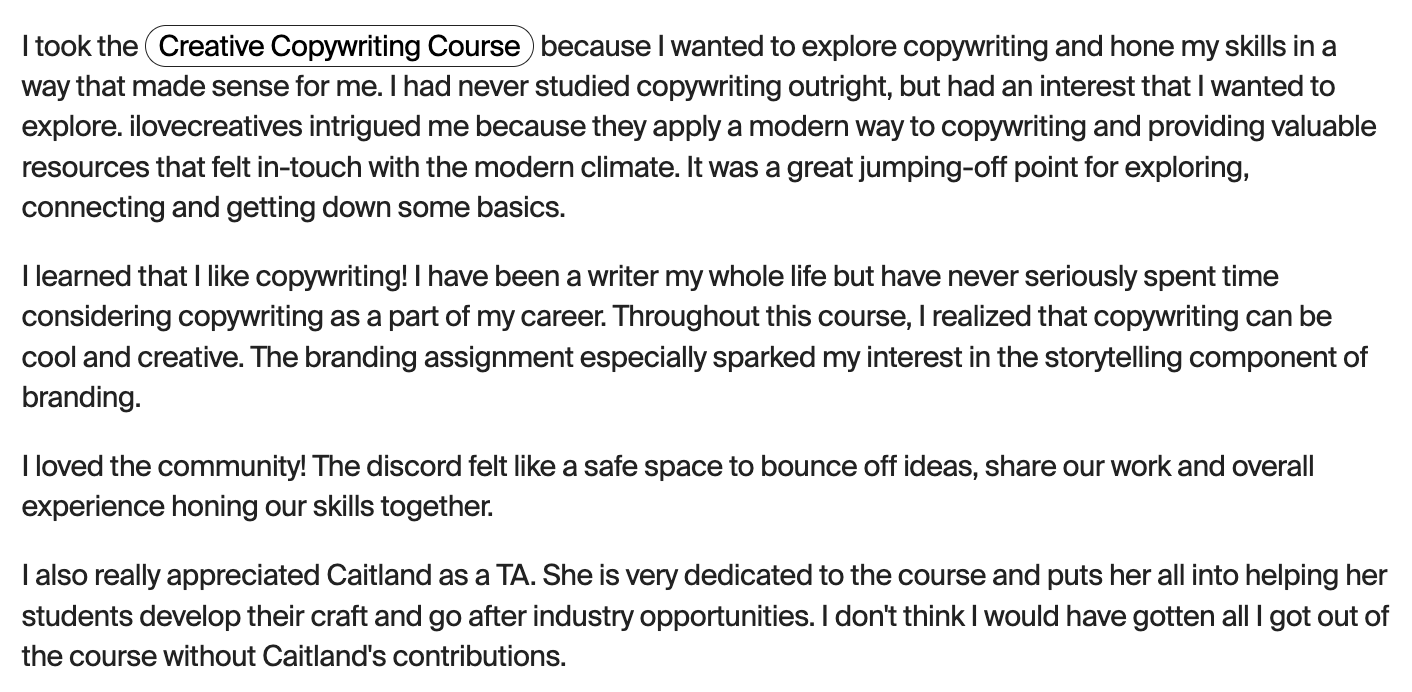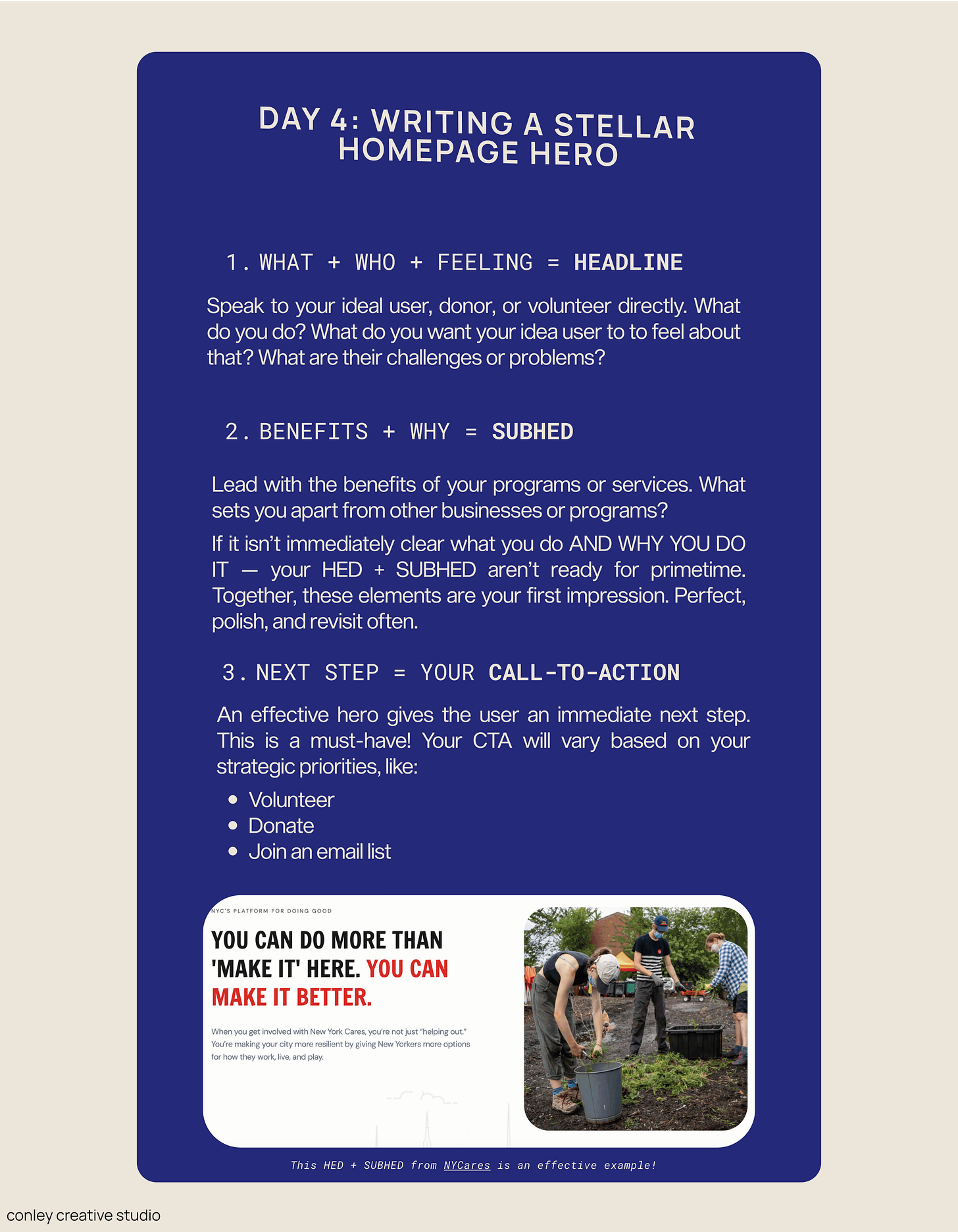For the past year and a half, I’ve worked as a part-time teacher’s assistant for ilovecreatives’ Creative Copywriting Course. It’s been energizing and, at times, frustrating because of our ongoing cultural devaluation of good writing. I think often about my students, their success, and longevity in the field — especially as the entire creative industry morphs (or crumbles, depending on your point of view and general level of optimism) before our very eyes.
As a TA, I’ve learned so much about the craft of copywriting I couldn’t verbalize before…which is funny because I’m a writer. Namely: there are formulas, tips, and tactics that can take a tagline from basic to buzzy. I’ve created entire frameworks for writing hero copy I use on the daily in my own job(s). There are modes of operating that help you sell your ideas to others and bolster your credibility professionally.
I’ve found half of the battle as a TA is helping students develop their taste. There’s a quality bar I strive for in every assignment I evaluate. Even if the writing is simple, it must be well-executed syntactically. There must be some indication of lateral thinking, as the most obvious idea is usually the most boring.
While I have hung up my TA hat for now to focus on other professional and personal writing projects, I want to share the most common patterns I saw, and examples of older-sibling/cool-distant-cousin type feedback I’d give to up-and-comers.
First, a favor!
Words of affirmation
Before I dive in, I want to share notes from students about my teaching and feedback style. They help answer the question: “Why should I listen to this person?”
I’ve been copywriting for ten years for brands like Vimeo and ilovecreatives, but these reviews are proof points as to how and why these tips really work for people.
Student 1:
Student 2:
Student 3:
Student 4:
Student 5:
01. On talent: Good vs. great students
Good students are, on the whole, a little bit invisible. They submit their polished assignments and I grade them, providing tasteful, minimal feedback. Oftentimes these are folks who have already been in the workforce a while; maybe they are career-pivoting or people who are more interested in ingesting the course material at their own pace than getting personalized feedback. There’s value in that. It shows a level of confidence in their ability that I respect. These students know what they want: a certificate indicating their completion and mastery of the material, and I’m happy to give them that.
However, great students — and this is purely personal observation, feel free to disagree with me — are squeaky wheels. They are sending me LinkedIn DMs and emails (respectfully) with questions. They are dutifully addressing comments on their work. They send me their resume to review it, or ask me to e-introduce them to someone in my network. They are cold emailing people out the gate.
Closed mouths don’t get fed in this or any other industry, and some of the best students I’ve had recognize this truth. For me, being a TA is a relational role — something that requires active investment in the livelihood of students as if it were my own livelihood.
Starting my career, I basically decided to say I was a copywriter even though I’d worked in more generalist digital marketing roles for years out of college. Lo and behold, it worked. What we say about ourselves is true, after all.
In recent years I’ve slid into countless LinkedIn DMs, leading to an informational interview that later got me a job that moved me to New York, and many awkward getting-to-know-you coffees in Soho. Once I even pitched my services at Friends & Lovers in Brooklyn on a Saturday night, which earned me my highest invoice ever at the time.
When I see this audacious quality in students, I get so excited. They’re not waiting for life to come to them! It has paid such dividends for me personally.
During my tenure as a TA, the best students I have were sponges for the material and highly interactive in Discord, cheering on fellow classmates, posting links to think pieces, sharing with the class. Being memorable in an online space is so hard; I find myself deeply impressed by the students who have wrangled new jobs and made friends as a result of taking a self-paced online course. That’s so cool to me.
02: Trusting yourself & your audience
Students struggle with brevity. Their natural inclination is to over-explain instead of letting the work speak for itself. Some do this in comments, others in the copy itself.
This is the equivalent to a comedian saying, “I’m going to tell a joke now.” It stunts the set up, rendering the joke totally unfunny.
In a corporate setting, the ideas you know are good and clever will often be beaten down and tenderized and dumbed down within an inch of their life. That’s the version that’ll go live, and that’s just how the world works. Three executives will wage a comment war on a 25-character Meta ad, then go with an AI-generated caption instead.
There are battles you’ll never win because everyone thinks they can write. It’s like modern art: everything thinks they could paint a Rothko but like, come on. A little credit where credit is due, please. This will be frustrating, because your audience is smart and capable, and you are smart and capable.
I only learned this recently — in perhaps the last six months — that the true measure of a good copywriter is in their ideas and the willingness to present something new even if it’s bound to be torn apart. Are you pushing for something more interesting even if it’ll never pass the eight rounds of stakeholder approval? Do you pine for something that feels unexpected and true?
There’s science to all this, sure, but I will always treat writing copy like an art. This is a craft sculpted by time and experience, not handed over willy-nilly to the highest bidder.
Basically, being a people-pleaser at this job results not only in a broken spirit, but in bad writing. As you build your career, I strongly recommend presenting your work in a language that protects your ideas. Your ideas are the newborn babies of your brain, and this career path doesn’t often traffic in affirmations and perfect R1s. No one else will stand up for what you know is right, unless you have a really good boss. And most people think copywriting = writing. Back to the Rothko I go.
A few tips to swaddle and protect your newborn intellectual property:
Reinforce the importance of mobile-friendliness and accessibility, especially in moments where a client wants a headline to stretch onto five lines
Reference back the brief whenever possible when voicing over your work. I regularly say, “In the kickoff we talked about…” “In the brief, there was the explicit ask to…” This is self-protective and shows nothing gets past you.
Test your ideas on real audiences, like using Lyssna or other user testing tools. Most employers will pay for this, especially if you can prove ROI through pre-post or A/B testing.
Constantly comment on what’s going well. Got a headline or a page you wrote that’s outperforming? Talk about your theories on why that may be.
Arrange your ideas from mild to wild. My boss saw this presented at a conference; I think it was a creative agency at Disney who implemented this idea. Listing your headlines or ads across the spectrum of mild, medium, and spicy 🌶️ help you lean into a brand voice at different angles. It’s good practice whether they go live or not.
03: The elusive hero
Copywriting is the pop music of writing. I said what I said.
Writing for the explicit purpose of selling something is inherently a contradiction. Much like the entire field. When I’m evaluating students, I’m looking for:
Copy that feels universal but is highly specific.
Copy that dials up an emotional experience that may seem incredibly specific but can apply to everyone on earth.
Copy that turns a cliche on its head, even though that means it’s still a bit of a cliche.
The homepage hero assignment is make-or-break for students, and it’s the one I see them get wrong time and again. Here’s why: they treat a hero like a vibe-y brand tagline.
The hero headline and subheadline are one of the greatest art forms of my copywriting career. I write at least one a week, if not more, for homepages and landing pages, acquisition pages for paid search, the works.
They are tedious and rarely are they an expression of your true capabilities as a writer. That’s why it’s so tempting to make them splashy or more interesting than they are destined to be.
My current boss says that a hero is a welcome mat or a front door to your product or service. It needs to be immediately clear what you offer, who you offer it to, and why they should care. In my book, hero copy needs to pass the “So what?” test.
So what if you have the no. 1 software for people who are monetizing content of their cats? Why should anyone care? What possible positive effect could x or y have on my life? These are the questions you want to answer in, oh, 100 or so characters, nbd.
Here’s a “worksheet” I made as part of a larger DIY website copywriting guide for small businesses and nonprofits, because I believe good copywriting should be more accessible! Right click and give this image a save.
04: Attention to detail is everything in this career
You would be amazed how many students use semicolons incorrectly, or ellipses for dramatic emphasis in the weirdest places. Social media has sorta ruined people’s ability to write prose seriously. Fragments only work when they feel intentional or rhythmic, when they serve a purpose. If everything is a fragment, then nothing is a fragment. The en dashes I’ve seen that should’ve been em dashes.
The core point here being: if you aren’t spell-checking or line editing your own work, your clients will dump you so fast, it’s not even funny. Especially when A* can grammar-check you and spit out a generic but half decent thousand-word essay in a millisecond.
It doesn’t matter how good your ideas are if your execution is poor. An errant typo here or there, I totally get! If anything, that’s a little quaint now because it shows a human wrote it. But overarching grammar weaknesses are a crutch, and usually they show me that a student needs to go through the material again in its totality before they are ready to be fully evaluated on the merit of their ideas.
Wrappin’ this up
This is probably way too long, but I’m passionate about this stuff! Now that I’m taking a break from TA-ing, I don’t want to lose track of these threads.
Is this insightful or helpful? Any topics you want covered? I’m all ears.
Bonus: the copywriting job directory
Want a tactical overview on building a copywriting career — featuring $$$ talks and coffee chats with real-world copywriters? (Psst…shoutout to the one-and-only for her insightful commentary in this guide.)
Here’s a copywriting career jumpstart I made in collaboration with ilovecreatives.









